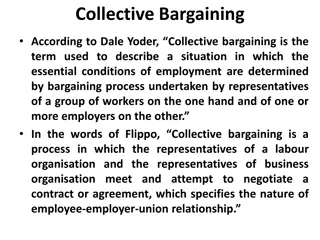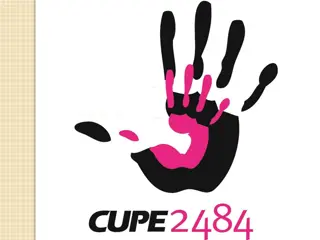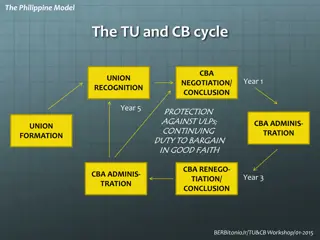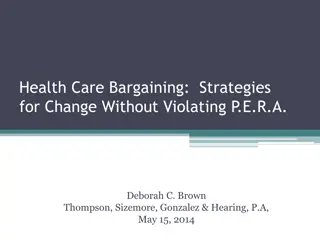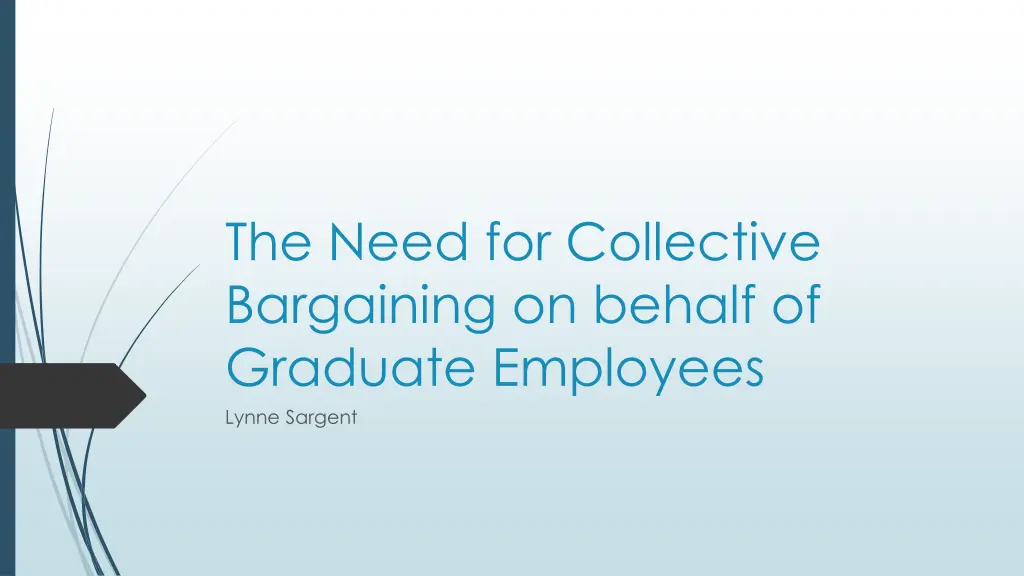
Collective Bargaining for Graduate Employees: Benefits and Challenges
Explore the importance of collective bargaining for graduate employees, including wage comparisons, perks in collective agreements, benefits, current issues, and next steps in the collective bargaining process to ensure fair treatment and recognition of value.
Download Presentation

Please find below an Image/Link to download the presentation.
The content on the website is provided AS IS for your information and personal use only. It may not be sold, licensed, or shared on other websites without obtaining consent from the author. If you encounter any issues during the download, it is possible that the publisher has removed the file from their server.
You are allowed to download the files provided on this website for personal or commercial use, subject to the condition that they are used lawfully. All files are the property of their respective owners.
The content on the website is provided AS IS for your information and personal use only. It may not be sold, licensed, or shared on other websites without obtaining consent from the author.
E N D
Presentation Transcript
The Need for Collective Bargaining on behalf of Graduate Employees Lynne Sargent
Wage Comparison Waterloo Guelph $33.16/hr ($5,305/term) (in 2018, 2019 still bargaining) School TA Western $45.83/hr (capped at 140 hours, overtime paid 1.5X) Not Unionized McMaster $43.63/hr (Union Dues 2.5%) Toronto $45.33/hr (Union Dues 2.45%) (3902) $42.31/hr Expected 160 hours Masters: $6,595/term PhD: $7,846/term RA /GSA $42.31/hr (in 2018, 2019 still bargaining) $43.63/hr (Union Dues 2.5%) Unclear Sessional $8,547/term $7374.95/se mester* @ Step 1 (in 2018, 2019 still bargaining) $16,699.58. full- course(part of Faculty Union) $7555/ term (cap: 238 hours of work) $16,116/ full- course (full year) (3902)
Perks in Collective Agreements Mandated and paid meetings to ensure you are not overworked/discuss workload management (U of T) Paid training to help with student mental health crises/inclusivity, etc.as well as basic training and health and safety training (various) Draft of Policy 30 still unclear as to if any training that s relevant later on will be paid or not @UWaterloo, TA training currently not mandated to be paid Mandated preference for graduate student TAs (U of T) Access to assistance funds (various) Unions can mandate that only so much $ from work can count toward your minimum funding ($8,200 @ U of T) Can mandate more $ for larger classes, or for a first-time sessional instructor to provide for prep (Sessionals @Guelph, no impact on # of TAs assigned)
Benefits to Collective Agreements Clarity around work expectations and compensation for various groups of workers Solidarity to attain better terms Flexibility to suit collective needs of a given group Ensure we are paid in a timely manner Meet with the University on equal footing and gain recognition as an important economic and intellectual engine that enables the University to exist
Current Issues Timeliness of Pay Discrepancies around sessional pay to current students Poor categorization of online instructors/sessional instructors Lack of training Overwork Total pay and compensation for graduate students is below poverty line in Waterloo Hostile political environment (Collective bargaining could be strategic for both students and the university, unions currently fighting Bill 124)
Next Steps Right to collective bargaining- worker driven CUPE & PSAC, or something else like the Faculty association? What do we want this to look like? Different faculties/departments have different needs, but all student workers deserve to be treated fairly and to have our value as workers recognized Not adversarial with the university, but rather gaining recognition and rights as the economic powerhouse and important service and knowledge workers that we are








